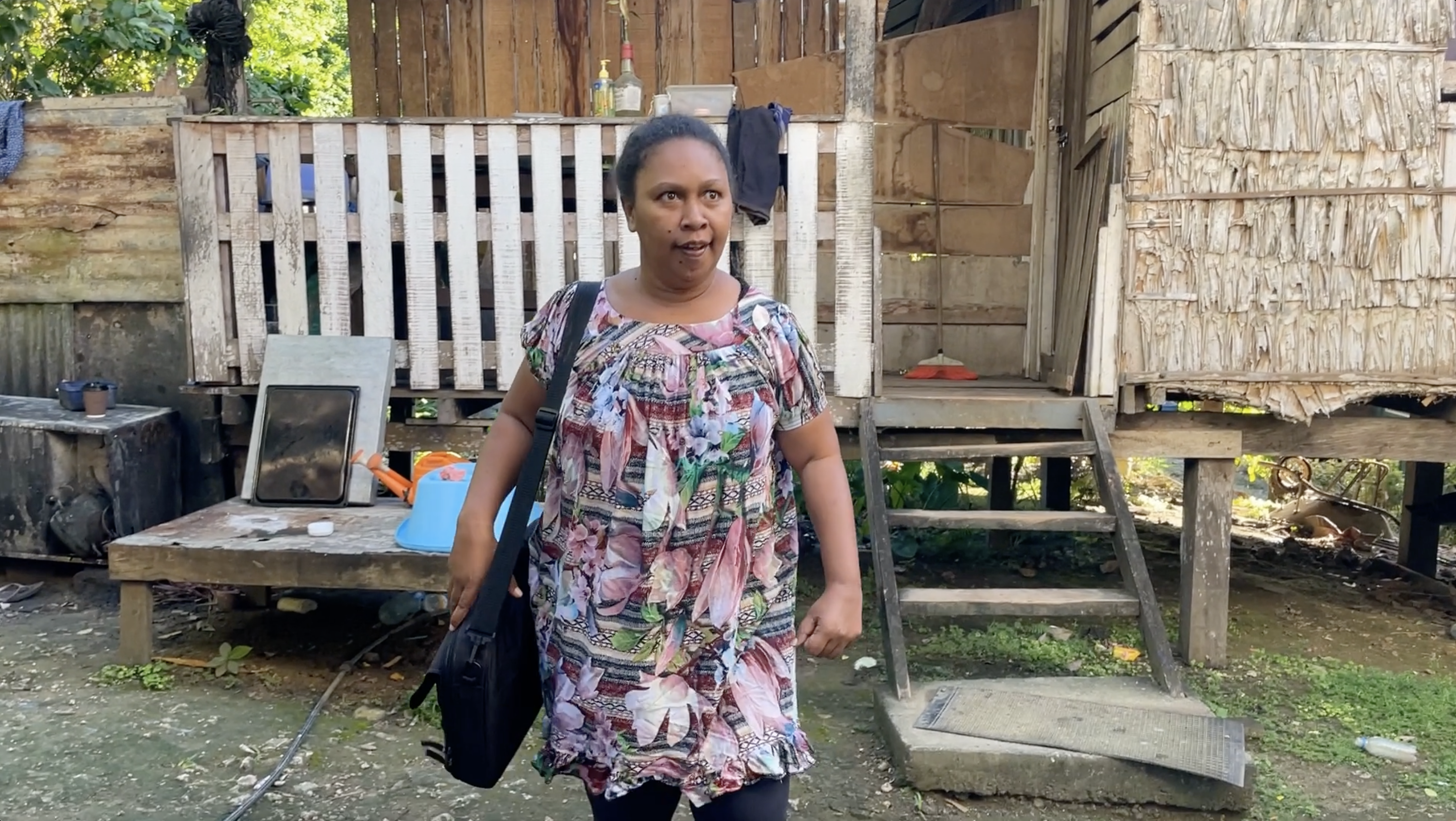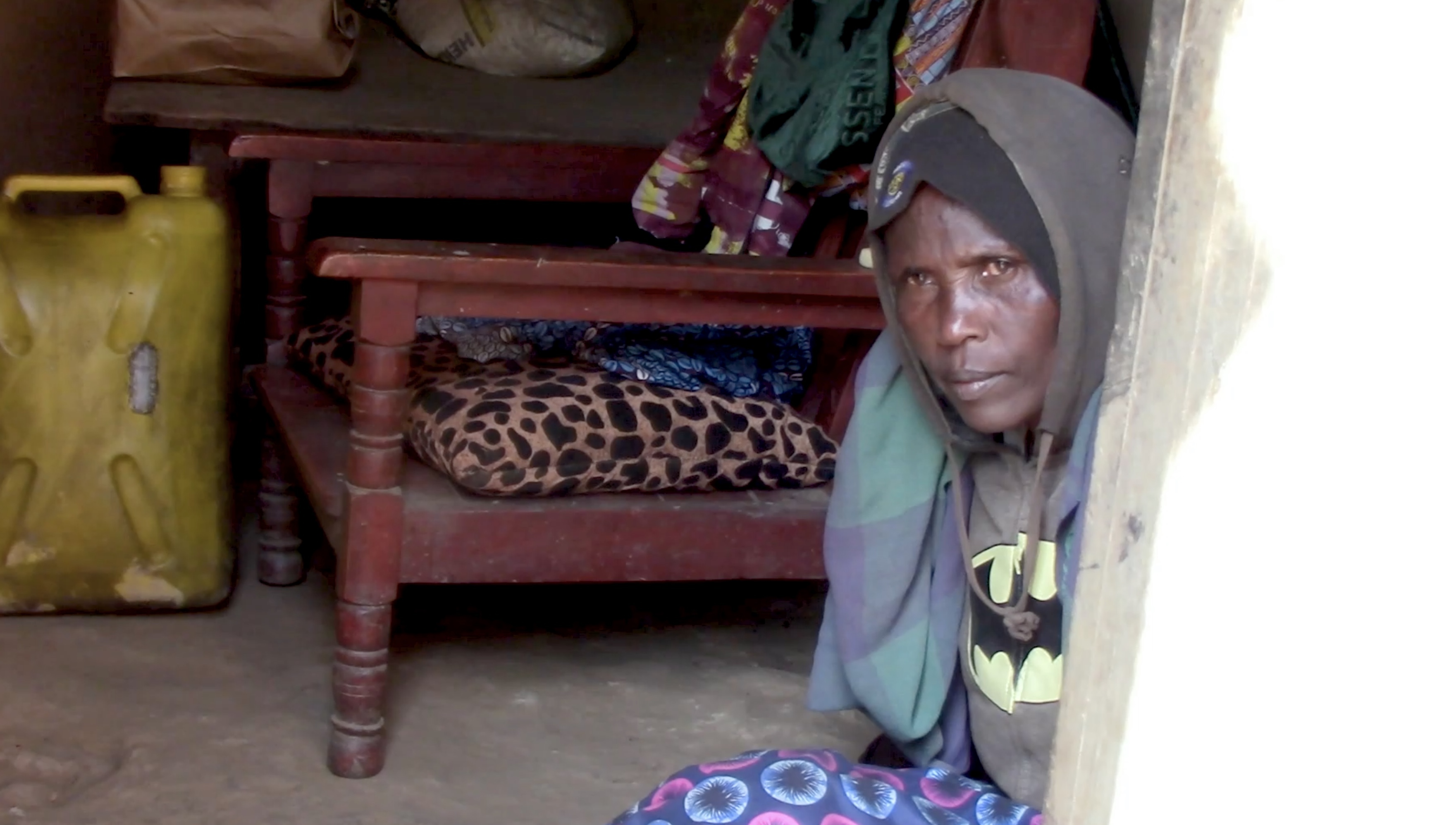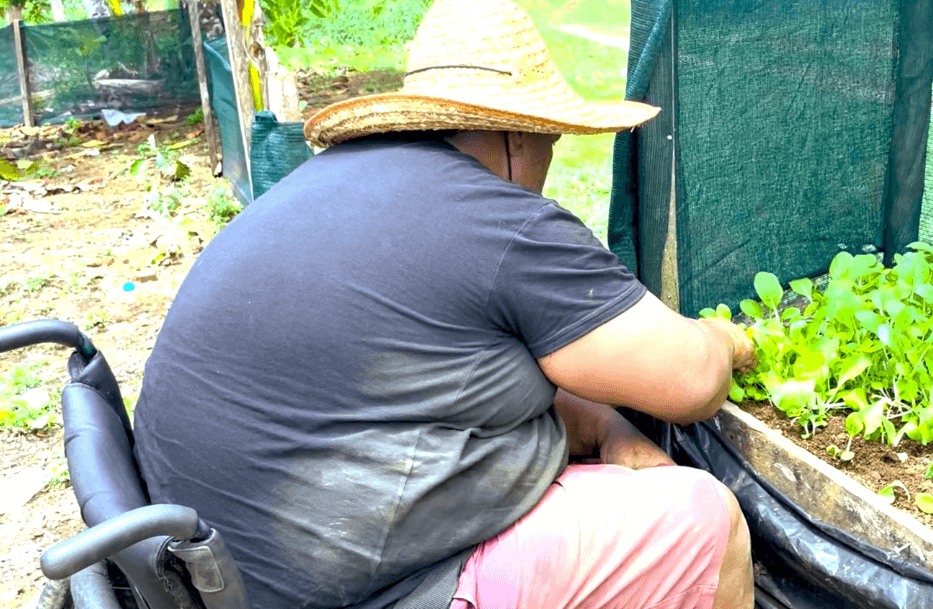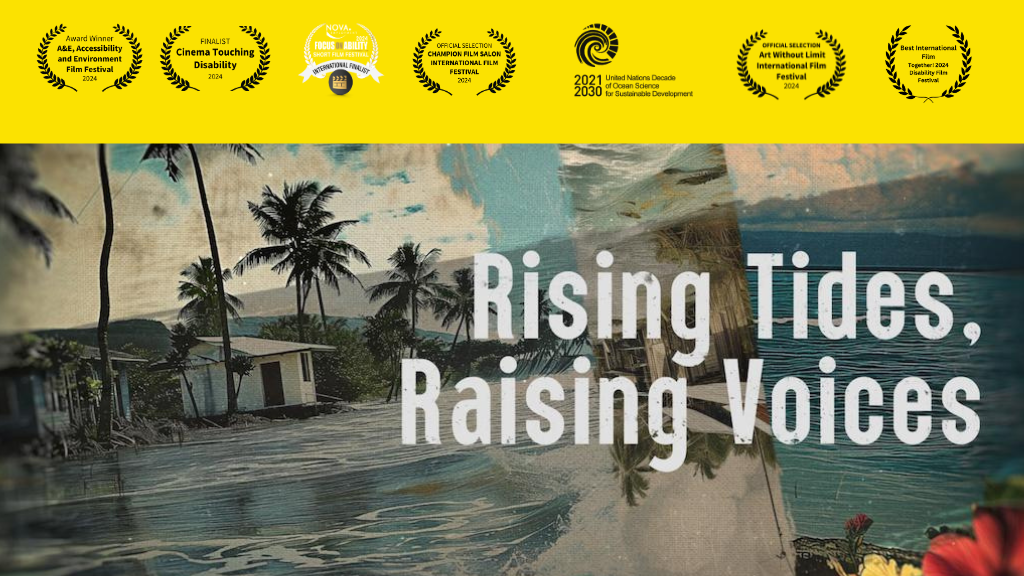Transcript for A ‘Bitter Pill’
The video starts with a piano instrumental and a video of cyclists, vehicles, and pedestrians moving by a street in Jakarta, Indonesia. High-rise buildings are in the background.
Fade to a timelapse of vehicles moving by a traffic-packed, tree-lined street in Jakarta. High-rise buildings are in the background. An Indonesian woman’s voiceover in Bahasa Indonesia says, “I used to work in a company in Jakarta. In 2012 I was fired because I was discovered as a person with a mental disability.”
Cut to the person behind the voiceover – Nurhayati Ratna Sari Dewi, an Indonesian woman wearing a yellow hijab. She is the head of the Indonesian Mental Health Association (IMHA)’s branch in Jakarta. Dewi sits outside and speaks to the camera: “I have worked for 20 years at my job. But at that time I had a bitter experience that I was discovered to have bipolar disorder. And then, I was dismissed.” Several plants and an exterior stairway are behind her.
Cut to Dewi working on a laptop in an office. She looks up to speak to someone off-camera. A long desk with office items is behind her.
Cut to Dewi speaking outside, “When I first started working, everything was normal. I started experiencing mental disability around 1997 when I was 18 years old. At that time, my condition was still mild, so I didn’t need to go to the doctor every month.”
Cut to Dewi sitting at a table outside. She is wearing glasses and a purple hijab. She speaks to a co-worker, who is wearing a white hijab on the left, and another person who is off-camera.
Cut to Dewi speaking, “I had a relapse in 2011 when I experienced baby blues postpartum. I did not know that this disease (Bipolar Disorder) should have regular treatment at the doctor every month.”
Cut to Dewi looking over a document with a co-worker in the office. Her co-worker, seated to the left, runs through the document with a pen. A laptop is in front of Dewi. Dewi is wearing a beige hijab, and her co-worker is wearing a white hijab. Another co-worker, wearing a black hijab, sits at the long desk in the background. Dewi’s voiceover continues, “I relapsed again in 2012. When I relapsed in 2011, I didn’t tell my boss that I was going to a psychiatrist.”
Cut to Dewi speaking, “And then when I went to a psychiatrist and it was discovered by the company’s doctor that I have bipolar disorder, eventually the stigma develops.”
Cut to Dewi speaking on a cell phone. She sits on a blue-and-white chair and leans against a white wall.
Cut to Dewi speaking, “At that time, I accepted that fact because the stigma of a person with a mental disability or mental illness was very negative.”
Cut to a pan shot of Dewi and two co-workers working on laptops in an office. A woman is seated on the left, Dewi is in the middle, and a man wearing glasses is on the right. Dewi’s voiceover continues, “If I get caught, I’ll be laid off just like that, so I just took that bitter pill.”
Cut to Dewi looking through documents in the office. A man stands behind her. Dewi’s voiceover continues, “At the same time, my co-worker was suffering from chronic kidney disease.”
Cut to Dewi speaking, “Which means he and I both have a chronic disease, a long-term disease. But back then I was fired, whereas he wasn’t fired. I find this very unfair.”
Cut to Dewi listening and taking notes in a notebook as someone off-camera speaks to her. Dewi sits outside with another person. She is wearing a black hijab, black glasses, and a multi-colored face mask.
Cut to Dewi speaking, “The disadvantage for person with mental disability at that time, is that we were not given reasonable accommodation, for example, a sick leave for us to rest. Instead, they judge us immediately. The disadvantage is that the stigma and discrimination against us is very unfair.”
Cut to Dewi and the two co-workers working on laptops in an office. The man removes an earbud and speaks to Dewi and the other co-worker. Dewi’s voiceover continues, “We were not given the opportunity to work, so it’s very detrimental for us.”
Cut to Dewi speaking, “But now there is law number 8 of 2016 where a person with disabilities cannot be fired for reasons of disability.”
Cut to a green-and-purple informational sign about the Indonesian Mental Health Association in Bahasa Indonesia. One forearm crutch is next to the informational sign.
Cut to Dewi speaking, “The solution for people with mental disability in general is actually reasonable accommodation, those adjustments. For example, we people with mental disability have to go to a psychiatrist every month, so what we hope from the company or the government, which will make government regulations reasonable accommodations.”
Cut to a close-up shot of an Indonesian woman’s hands as she works on a laptop. The woman is wearing a white hijab, and plants are in the background.
Cut to Dewi speaking, “Is that they will allow us to see a psychiatrist for regular check-up once a month without any leave deductions. Second, we hope that they will give us time to rest when we are sick, don’t fire us.”
Cut to an Indonesian woman wearing a light pink hijab and suit. She walks to a window, takes a deep breath, and smiles. A shelf with plants is in the background. Dewi’s voiceover continues, “Third, provide us a quiet room to relax when we’re burned out or when we need some time to rest.”
Cut to Dewi speaking, “Fourth, give us worktime flexibility, because sometimes it’s hard for us to fall asleep at night. Also, allow us to come late or allow us to do our work from home because the important thing now is that we get our work done.”
Fade to two office workers looking over financial documents with pens. In front of them, a laptop and a computer are on a table. An Indonesian woman’s voiceover in Bahasa Indonesia says, “I used to work in a hotel in Bandung as accounting staff.” The piano instrumental from the start of the video transitions to another piano instrumental.
Cut to the person behind the voiceover – Lily Puspitasari, a young Indonesian woman with long black hair. She is wearing black glasses, sitting in a room, and speaking to the camera: “My co-workers didn’t distinguish their attitude toward me because my illness had not been discovered at the time. But later, I attached a letter from a psychiatrist, that’s why my illness was discovered.”
Cut to a close-up shot of an Indonesian person opening a letter at a desk. A laptop, pen, and notebook are on the desk.
Cut to Pupsitasari speaking, “It was my own initiative because I skipped work for 2 days.”
Cut to a close-up shot of Puspitasari speaking, “Their response was very different from what I expected. Because I was expecting them to understand why I skipped 2 days of work.”
Cut to Puspitasari stepping through a brown door.
Cut to Puspitasari speaking, “But then, I didn’t get a first warning letter nor a second warning letter, but I was fired the next day after I attached the letter from my psychiatrist.”
Cut to Puspitasari sitting outside and flipping through a magazine. Her voiceover continues, “In my opinion, they should have given me a chance to explain why I attached the letter.”
Cut to Puspitasari speaking.
Cut to an Indonesian woman looking upset. She is frowning, and her hands are on her temples. The woman’s black hair is in a pulled-back hairstyle. She sits at a desk, and on the right, a small cardboard box contains binders and other office items. A co-worker walks up to her and pats her shoulders to console her.
Cut to Puspitasari speaking, “They shouldn’t have fired me immediately and the government should have given us reasonable accommodations, so that I can feel like there’s a second chance to work. For example, a quiet room when we’re stressed or if we feel our productivity is low.”
Cut to plants, a table, and two chairs on a skyscraper balcony. Other skyscrapers are in the background.
Cut to Puspitasari speaking, “Work can also be done from home.”
Cut to a close-up shot of an Indonesian person’s hands working on a laptop at a desk. A stack of books is on the desk. Puspitasari’s voiceover continues, “Because psychiatric medicine sometimes makes it hard for us to wake up in the morning.”
Cut to Puspitasari picking up a drink next to a kitchen stove and taking a sip. The kitchen’s counters are full of cooking ingredients and cooking tools. Her voiceover continues, “So it would be better if the usual worktime started at 8AM and finished at 5PM, shifted to start at 10AM and finish at 7PM. It’s fine in my opinion.”
Cut to a young Indonesian woman wearing a beige hijab. She is working at a computer in an office with two co-workers. All the workers are wearing blue shirts.
Cut to Puspitasari speaking, “Society should not treat us differently because we are the same human beings who have many shortcomings. So it’s better not to discriminate us because it will make us feel down.”
Fade to black text with a yellow border on a black screen that says, “Copyright – @2022 IMHA. All rights reserved.”
Fade to black text with a yellow border on a black screen that says, “Made with support from the Disability Justice Project and Disability Rights Fund.” The Disability Justice Project logo is a large yellow “D” with a black play button in the middle to signify video storytelling, and white text says “Disability Justice Project” on the bottom left. The Disability Rights Fund logo – a white box with black text that says, “Disability Rights Fund” – is on the bottom right of the screen.






